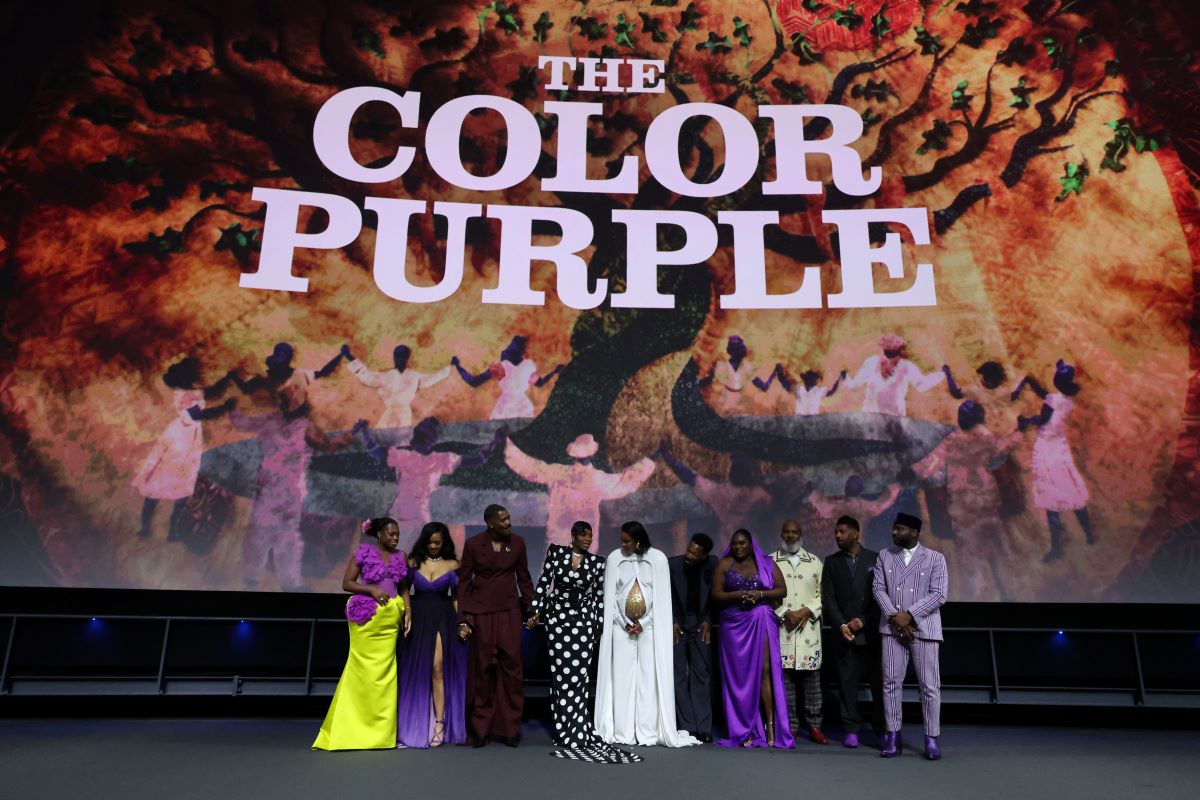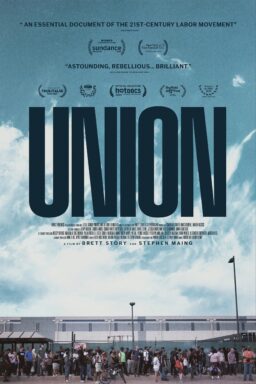Those attending the special screening of "The Color Purple" at the Samuel Goldwyn Theater in Beverly Hills in mid-November were treated to a one-hour post-screening panel discussion by 11 members of the cast and production team led by producers Oprah Winfrey and Scott Sanders, a situation only made possible with the ending of the SAG-AFTRA strike on November 9th, 2023.
Director Blitz Bazawule opened the screening with remarks and returned to the stage for the panel moderated by Angelique Jackson, senior entertainment writer at Variety. Besides Winfrey and Sanders, the panel included "American Idol" third season winner Fantasia Barrino (the adult Celie), Danielle Brooks (Harpo's wife Sofia), Taraji P. Henson, Colman Domingo (Albert "Mister" Johnson), Corey Hawkins (Albert's son Harpo Johnson), Gabriella Wilson aka H.E.R. (Squeak, Harpo's girlfriend after Sofia leaves him), Halle Bailey (as the young Nettie) and Phylicia Pearl Mpasi (the young Celie).
Alice Walker won a Pulitzer Prize for Fiction, the first African-American woman to win the award, for her 1982 novel about Celie, an African-American Southern woman surviving poverty and domestic violence in the early 20th Century rural Georgia. The novel opens with the 14-year-old Celie pregnant for a second time by her father, forced to give away the child. Her father marries her off to a brutal widower with three wild children who had originally asked to marry Celie's younger sister Nettie. Nettie soon joins her seeking to escape rape by their father, but Celie's husband has similar intentions. When Nettie refuses to submit, he throws her out and the sisters are separated. While Celie is meek under her husband's abuse and even allows him to bring his mistress, traveling singer Shug Avery, into their house, she witnesses the hardship of the assertive Sofia, the wife of her stepson Harpo. Shug and Sofia become Celie's friends, and Shug helps Celie leave her husband.
Steven Spielberg (a producer on the 2023 film) directed the 1985 cinematic adaptation, which although nominated for 11 Academy Awards, including Best Actress for Whoopi Goldberg and Best Supporting Actress for Margaret Avery (Shug Avery) and Oprah Winfrey (Sofia), won no Oscars.
During the panel discussion, Winfrey recalled, "'The Color Purple' changed my life in 1985." Reading the book was a revelation for Winfrey "because until that time I didn't know that there was language for what had happened to me, and the first line of the book is, ‘Dear God, I am 14 years old. Please help me know what's happening to me.'" That spoke to Winfrey's personal experience because, "I had been raped and had a child at 14 who later died, and I did not have any language to explain what that was."
Later, Scott Sanders and Oprah Winfrey produced the stage musical (book by Marsha Norman and music and lyrics by Brenda Russell, Allee Willis and Stephen Bray), which originally ran on Broadway from 2005 to 2008 and won a Tony Award for Best Actress in a Musical (LaChanze). It's 2015 revival garnered Cynthia Erivo a Tony in the same role as well as a Tony for Best Revival of a Musical.
While it's been over 30 years for "The Color Purple" on the silver screen, the journey for Bazawule has been faster. He recalled that in 2019, "I made a small movie in Ghana for $40,000 of my own. I screened it across the street for about 3 people who were there." He added, "This journey of going from unseen to seen which is Celie's ultimate story" is a tremendous blessing, particularly coming from Ghana "where we're told we cannot participate; we cannot compete." Born in Ghana, but now based in New York, Bazawule was nominated for a Grammy in 2020 for directing Beyoncé's "Black Is King."

Yet Bazawule noted he did ask himself, "Why do it again?" Re-reading the book, he found the first words, "Dear God," were the key because "anybody who can write to God must have an imagination." He continued, saying, "I knew that if we could just access Celie's imagination, we'll understand most people who deal with trauma and abuse are often mis-categorized as docile, waiting to be saved. That is not the case. They are working actively in their heads to try and free themselves." He added, "Once we figured out how to keep expanding Celie's headspace, anything she could imagine, she could have, including how to love, who to love, how to love herself, I knew we would have a movie that would truly contribute to the brilliant canon that is The Color Purple.''
It was Bazawule's interpretation (with a screenplay by Marcus Gardley) that convinced Barrino to return to the role she had assumed during the original Broadway run (April 2007 to January 2008) and during the 2010 National tour. Barrino said that time changed her interpretation because "I'm grown now, and I realized Celie was not so bad. I thought it was bad back then, but I just related to her. My life was in shambles." She then explained, "This time I realized, she was pretty dope." During the filming, Domingo and Henson helped her because "they made sure when I dug deep, they caught me in the end."
Although Henson has a commanding presence as the lusty and vibrant Shug, she first thought Bazawule had the wrong number when he called. She had previously shrugged off the role of Shug Avery because she didn't want to blow away her vocal cords on eight shows a week. "But the funny thing about life is that when something is destined for you, you can't run from it, because I tried and Shug still found me. I guess you can say that I was destined to play this role."
Brooks was only 15 when she saw "The Color Purple" on Broadway in 2005 and "it changed my world because I saw people who looked like me, it gave me a path." Then in 2015 while she was doing "Orange is the New Black," she wondered who would be cast for Sofia for the revival, thinking that she could not do both. And yet, she did. "I just remember singing 'Hell No' every night. I used it as a shield. I had imposter syndrome and fight that thing every day."
While "The Color Purple" focuses on the experience of Black women, the image of Black men is also part of the equation. Domingo told the audience, "I never thought I would be in a (musical) production of 'The Color Purple' in any way" because "I sing, but I don't sing like that. I know my skills." Yet he received a Tony Award nomination for Best Featured Actor in a Musical for the 2011 "The Scottsboro Boys."

For the role of Celie's violently abusive husband, Domingo said it was important to him that "any representation of a Black male in the world I feel like I want to give our full humanity." He explained, "It's easy to write off a character like Mister; it's easy to write off anyone who's an abuser," however, he wanted "to make sure I understood how Mister operates in the world and what he needs and where his heart is broken by these systems he's under which is America. I think we're dealing with trauma of Black folks in America." After all, Domingo noted, "He wasn't born this way. What generational trauma, what are you lacking and then why must you put the foot on someone else's throat to make you feel bigger?"
Harpo, on the other hand, is able to break the cycle. Hawkins said of Harpo, "He makes a decision to change; he makes a decision to break these chains." Of course, "All of these characters are flawed; we all are flawed" but there is also the good of "God inside." Because of this "how can you look at someone else and see someone that you might hate and not see God?"
Despite the weighty topics that "The Color Purple" covers, the book and both films are filled with hope and even joy. Bazawule said, "For me, it was very important for as Celie was dealing with deep trauma and challenges in her life, there's always room for joy. I made sure in every frame, even though the circumstances were not beautiful, you can find beauty." And in the Samuel Goldwyn Theater which is decorated with oversized replicas of the Oscar, there was not only beauty and joy for the musical adaptation, there was also Oscar buzz.
"The Color Purple" will be released nationwide on December 25th.












